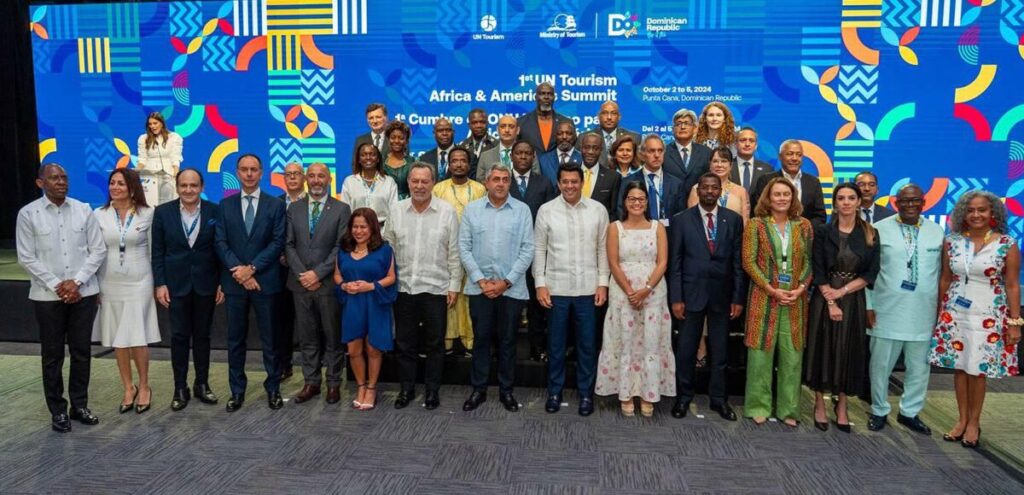Tourism leaders from Africa and the Americas signed the Punta Cana Declaration, pledging to work together and strengthen the tourism sector for sustainable and inclusive development across both continents.
Tourism leaders in Africa and the Americas are jointly committed to working together to make the sector a pillar of sustainable and inclusive development across both continents.
The Punta Cana Declaration was adopted at the end of the first joint meeting of the United Nations Tourism Organization’s Regional Committee for Africa and the Americas, following two days of shared dialogue around the key themes of education and investment in the sector. Ta. Recognizing the historical links between the two regions and their unique and complementary cultures, the summit established a plan to strengthen cooperation and leverage innovation, education, investment and creative industries for the future development of tourism. It served as a temporary platform.
Zurab Pololikashvili, UN Secretary-General for Tourism;
Welcoming around 200 high-level participants, including 14 ministers representing 27 countries (15 in the Americas and 12 in Africa), UN Tourism Secretary-General Zurab Polokashvili said: “This summit provides a unique platform to forge connections and build bridges between Africa.” This is done for the benefit of the tourism sector in both regions. ”
Welcoming the delegation, Mr. David Corrado, Minister of Tourism, Ministry of Tourism of the Dominican Republic, and Ms. Auxilia Mnangagwa, Chairperson of the Regional Commission of the Americas and Patron of the Ministry of Tourism of the Dominican Republic, also joined the UN Tourism Leadership Team and announced the cooperation between the two regions. encouraged the construction of bridges. Zimbabwe, First Lady of the Republic of Zimbabwe.
“Africa and the Americas are blessed with a rich cultural heritage, diverse landscapes and deep historical connections,” said Natalia Bayona, United Nations Tourism Secretary. We recognize that due to multiple challenges, including a lack of market awareness, the relationship between our tourists is not as strong as it could and should be.
Our goal today is to address these challenges head-on and foster collaborations that foster economic development, promote cultural exchange, and encourage sustainable practices that benefit all communities. ”
Punta Cana Declaration
As a clear sign of South-South cooperation, the Punta Cana Declaration established a set of common commitments for the development of tourism as a driver of inclusive development. Through this declaration, tourism leaders from both regions firmly focus on “strategic investments, education, innovation and creative industries” and pledge to “strengthen joint efforts to promote sustainable development” through tourism. Recognizes the need. The Punta Cana Summit Declaration also emphasizes the importance of tourism as a tool to preserve our shared and unique culture and heritage.


The signatories of the declaration indicated their intention to “redouble efforts” in, inter alia, the following areas:
Strategic investment: Strengthen public-private partnerships, stimulate investment in the sector and prioritize investment through effective policy-making. It will also foster connectivity between the two regions, both in terms of improved air links and enhanced cultural exchange. Skills development and training: Prioritize investment in tourism education and training, expand access to online and offline learning, and foster innovation and the use of new digital skills to improve the knowledge of tourism workers. Innovation: Support competition for start-ups and entrepreneurs in both regions, better support small and medium-sized enterprises, including in rural areas, and create innovative solutions with a focus on sustainability and climate action. Promote. Creative industries: Promote the role of cultural and creative industries in the tourism sector and the benefits the sector brings through funding projects that have the potential to attract tourists and grow new and diverse destinations and cultural routes. to ensure focus. Social and inclusive development. Interregional cooperation: Supporting market analyzes and other research to identify potential areas of common growth and opportunities and develop common strategies for tourism development through digital media, new products, international tourism trade fairs, etc. Investment and education: “Building a better tomorrow today”
Consistent with the United Nations Tourism Organization’s broader focus on investment in the tourism sector, the summit brought together leaders from the public and private sectors, along with key representatives from financial institutions, to discuss the current situation, trends and trends in Africa and the Americas. Assessed the outlook.
High-level speakers pointed to the great potential for joint investment initiatives between the two regions and emphasized the increasing role of public and private banks. The summit also highlighted the critical importance of investments, particularly in the infrastructure and hotel sectors, to drive the green transition of tourism in both Africa and the Americas.
In addition to innovation, the summit also focused on education and training, highlighting the urgent need for skilled workers in both regions. With a focus on “young talent leading change,” tourism industry leaders recognized the need for joint capacity building initiatives, curriculum development, and partnerships between academic institutions, industry stakeholders, and government agencies.


Theodore is the co-founder and editor-in-chief of the TravelDailyNews media network. His responsibilities include business development and long-term opportunity planning for TravelDailyNews.

